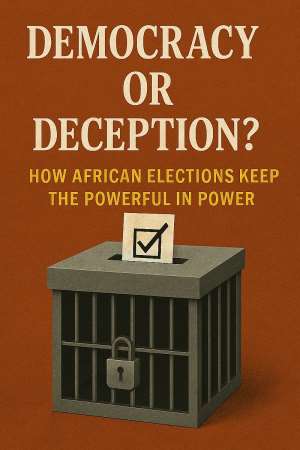
Democracy or Deception? How African Elections Keep the Powerful in Power
Every few years, across Africa, the ballot boxes come out, candidates flood the airwaves, and citizens line up under the sun to vote. The continent appears to be ticking the boxes of democracy. But what if this entire show this dance of democracy is nothing more than a clever performance? What if elections, in many African countries, are not instruments of change, but tools of deception used to keep the same elites comfortably in power?
From Nigeria to Uganda, Zimbabwe to Cameroon, the pattern is disturbingly familiar. Ruling parties dominate public institutions, shape electoral commissions, and deploy security forces to tilt the field in their favor. Meanwhile, opposition candidates are arrested, intimidated, or disqualified on dubious grounds. Even where elections seem peaceful, the process is often rigged from within: inflated voter rolls, “ghost” polling units, and delayed results announcements that serve only one purpose manufacturing consent for the status quo.
These are not minor flaws in an otherwise functioning democracy; they are features, not bugs. They are how elections are engineered to look legitimate while preventing real change. The ruling class adapts the language of democracy, freedom, progress, reform but behind the scenes, they guard their power like royalty.
And let’s be clear: for many African elites, holding public office is not a call to serve. It’s an opportunity to access state resources, build patronage networks, and secure immunity. Political power becomes a family business passed from father to son, or from military general to preferred successor. In such a system, elections do not threaten power, they protect it.
What’s worse is how ordinary Africans are affected. When votes don’t count and change never comes, the public loses faith not just in leaders, but in democracy itself. Youth disengage, turn to violence or migration, or worse, fall into the hands of extremists who promise radical change through other means. The message becomes clear: if the system cannot be trusted, why participate at all?
Still, there is hope. Across the continent, a new generation of activists, journalists, and reformers is rising. From the #EndSARS protests in Nigeria to youth-led movements in Senegal and Sudan, Africans are demanding accountability. Technology and social media have become weapons of exposure, allowing citizens to document abuse and amplify truth. But these movements need support not just moral words from the international community, but concrete action against regimes that use elections as smokescreens.
The West, in particular, must stop accepting rigged outcomes simply because they bring “stability.” Stability built on silence and suppression is not peace; it is a ticking time bomb. And African citizens deserve more than carefully managed chaos.
It’s time to ask hard questions: Are African elections really democratic, or are they clever deceptions? Who benefits from this illusion? And what will it take to turn the ritual of voting into a true exercise of power by the people?
Until we face these truths, we risk dressing up autocracy in democratic clothing and calling it progress.


